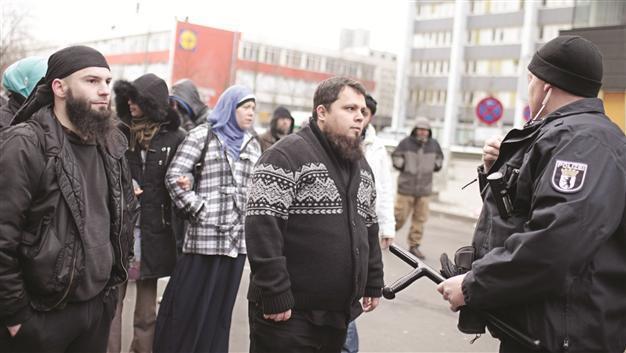Netherlands, Germany alarmed over Islamist extremists
BERLIN / NETHERLANDS

A German policeman faces Salafis leaving an abruptly ended demonstration in Berlin. Germany banned three Salafi groups. AFP Photo
The Dutch government raised its terror threat yesterday amid concerns that Dutch citizens traveling to Syria to fight in the civil war could return battle-hardened, traumatized and further radicalized.
The government cited the threat posed by jihadist fighters returning from Syria, where rebels are battling government forces, and signs of increasing radicalization among Dutch youth as key reasons for lifting its threat level from “limited” to “substantial.” The level is now the second-highest on the four-step scale, just below “critical.”
“The chance of an attack in the Netherlands or against Dutch interests abroad has risen,” the country’s National Coordinator for Security and Counterterrorism said in a statement.
The warning comes just two months before hundreds of thousands of people are expected to descend on Amsterdam for mass celebrations for the abdication of Queen Beatrix and coronation of her son, Crown Prince Willem-Alexander.
Counterterrorism chief Dick Schoof said nearly 100 people had traveled from the Netherlands to Africa and the Middle East, mainly to Syria, to fight and warned that it was not just a Dutch problem.
“These jihadist travelers can return to the Netherlands highly radicalized, traumatized and with a strong desire to commit violence, thus posing a significant threat to this country,” Schoof said in his statement.
He said several fighters had already returned to the Netherlands and were being monitored.
Government terror experts also say political upheaval in North Africa and the Mideast were giving terror networks room to grow.
Schoof said Dutch intelligence and law enforcement agencies were working with other European allies to contain the threat. More intelligence staff are monitoring “jihadist travelers” and police are stepping up efforts to tackle radicalization in Dutch towns and cities.
Last month, France also expressed concerns about its citizens heading to Mali to join radical Islamic fighters there, even as the French army was fighting the Muslim militants in its former colony. French police arrested four youths last month suspected of trying to join radical Islamic fighters in West Africa and expelled radical imams and others considered risks to public order.
Germany’s Interior Ministry also said yesterday that in 2012, 220 people from across Europe went to Syria to fight. Of those, fewer than 10 were from Germany. The majority of German jihadist travelers picked Egypt as their first destination in 2012, and then traveled on either to Mali, Syria or Yemen, according to German intelligence information.
Meanwhile, German authorities banned three ultra-conservative Salafi Muslim groups which the Interior Ministry said wanted to overturn democracy and install a system based on shariah. The ban, which took effect in the western states of Hesse and North Rhine-Westphalia in the early morning, is the latest step taken by German authorities who have increased surveillance of Salafis who espouse a radical version of Islam. The ministry said it has banned the organizations “DawaFFM” and “Islamische Audios,” as well as “An-Nussrah,” which is part of the “Millatu Ibrahim” group that was outlawed in June 2012. Some 20 people were searched and assets belonging to the organizations were seized, said the ministry.
“Salafism, as represented in the associations that were banned today, is incompatible with our free democratic order,” Interior Minister Hans-Peter Friedrich said in a statement.
“[The groups] aim to change our society in an aggressive, belligerent way so that democracy would be replaced by a Salafi system, and the rule of law replaced by shariah law.”
Friedrich said the step was part of efforts by Chancellor Angela Merkel’s center-right government to promote a tolerant and respectful relationship with the large number of peaceful Muslims in Germany.
Compiled from AP and Reuters stories by the Daily News staff.
Compiled from AP and Reuters stories by the Daily News staff.
